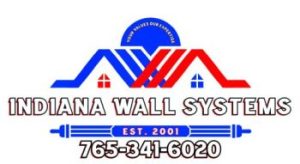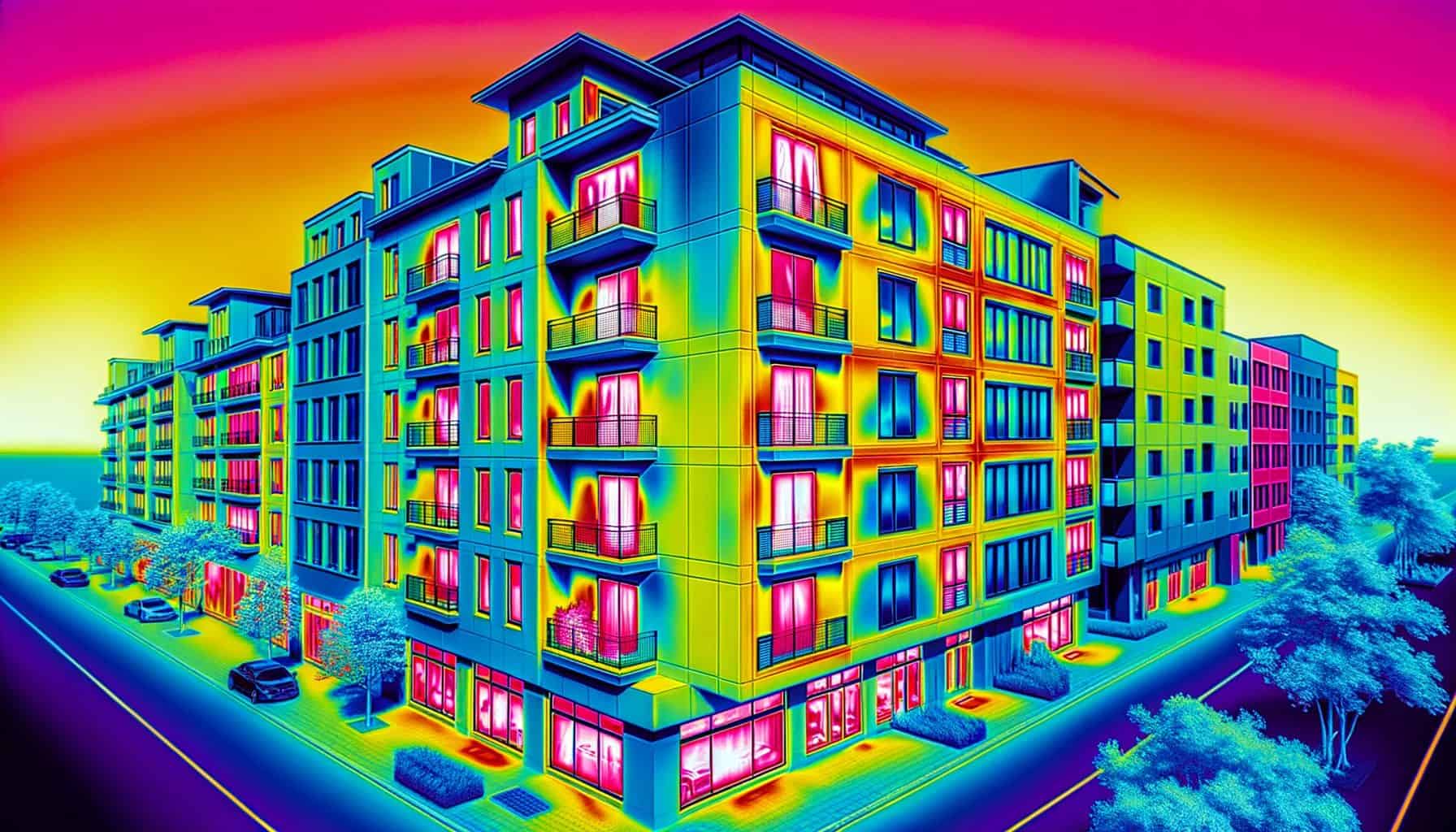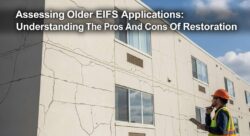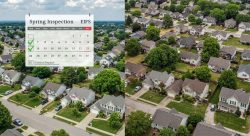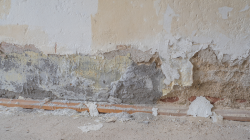Protect Your Home’s Integrity: A Step-by-Step Guide to Hassle-Free EIFS Inspection
Do you want to make sure your home is safe and ready for an EIFS inspection? You’ve arrived at the right spot! In this article, we’ll give you a complete checklist. This will help you get ready for your inspection. You’ll be at peace knowing your home is in good shape.
Understanding EIFS: What It Is and How It Works
Exterior Insulation and Finish System (EIFS) is a multi-layer building envelope system that combines insulation, drainage, and decorative finish. It includes foam insulation board, a reinforced base coat, a protective mesh, and a durable topcoat.
Benefits of EIFS include thermal insulation, cost-effective aesthetics, and versatility. They help reduce energy consumption and improve indoor comfort.
For an EIFS inspection, check for any signs of damage or deterioration. Ensure proper caulking around windows and doors. Inspect any areas where the EIFS system interfaces with other building elements.
Regular maintenance and repairs are crucial for efficient performance. Consider hiring a professional EIFS inspector to ensure accurate evaluation. This precautionary measure will save you from surprise water damage and bank account overdrafts.
Why EIFS Inspection Is Essential for Homeowners
EIFS Inspections: Why Homeowners Should Prioritize It.
Homeowners need to carry out a close inspection of their EIFS for structural integrity, energy efficiency, and aesthetic upkeep of their property. By conducting a thorough inspection, they can spot any potential issues and take necessary actions to avoid further damage and costly repairs in the future.
Inspections allow homeowners to identify signs of damage or deterioration that could compromise the performance of their property. They can attend to these matters proactively and conduct necessary repairs or maintenance work. Regular inspections also help assess the energy efficiency of the property. This reveals areas where insulation may be compromised or improvements can be made for energy conservation.
EIFS inspection also involves aesthetic maintenance. Over time, EIFS can develop cracks, discoloration, or water intrusion. Homeowners can ensure their property looks great and holds its value by conducting regular inspections and addressing these cosmetic concerns promptly.
Professionals are recommended for EIFS inspections because of their expertise and knowledge in recognizing potential issues that may be hidden to the untrained eye. Professional inspectors have specialized equipment and tools which make for more accurate assessments.
Industry experts at recommend regular EIFS inspections as part of a proactive home maintenance plan.
Pre-Inspection Steps for EIFS
- Clean the EIFS exterior to get a clear view.
- Check for possible cracks, chips, discoloration, and water intrusion.
- Look for moisture and document findings.
- Make a list of questions and remove obstacles for the inspector.
- Clean regularly to maintain a good look and prevent problems.
- Document visible damage before contacting an inspector.
- Prepare questions in advance to get detailed insights.
- Get ready for your house to be scrutinized!
During the EIFS Inspection: What to Expect
When inspecting EIFS, homeowners should anticipate certain procedures and outcomes. It is essential to understand what to expect during this stage to guarantee a thorough evaluation of the exterior insulation and finish system. Here are the key elements to consider during an EIFS inspection:
- Moisture Detection: Specialized tools and techniques will be used to detect any moisture seepage within the EIFS system, recognizing potential problem areas.
- Check Cracks and Surface Damage: The inspector will carefully inspect the EIFS surface for any cracks, blisters, or other signs of damage that may show underlying issues needing attention.
- Inspect Sealant Joints: The inspector will evaluate the integrity of sealant joints around windows, doors, and other penetrations to ensure they are sealed and functioning correctly.
- Assess Insulation Performance: Through thermal imaging or other tests, the inspector will assess the insulation performance to identify potential thermal bridging or insufficient insulation.
- Examine Finish Coats: The finish coats will be closely examined for adhesion problems, discoloration, fading, or other issues that may impact its appearance and durability.
The inspector may also review pertinent documentation related to the EIFS installation process and maintenance history. This data can give insights into any earlier repairs or issues that may require further assessment.
Note that every inspection is exclusive in its method based on particular conditions. Homeowners must employ a qualified professional with knowledge in EIFS inspections to assess their individual case accurately.
Keep in mind that certified EIFS inspectors or building inspectors are usually the ones who conduct EIFS inspections. [Source: National Association of Home Builders]. Don’t take risks with your EIFS inspection – go for a certified inspector to avoid plastering over the cracks of potential problems in your home.
How to Choose a Certified EIFS Inspector
Need an EIFS Inspector? 3 Things to Consider!
- When selecting an inspector, prioritize those with qualifications and certifications related to EIFS inspections. Look for professionals who have completed training programs from reputable organizations.
- Experience is also key. Choose an inspector with substantial experience in conducting EIFS inspections. They’ll be able to give a thorough assessment of your system.
- Research the reputation of potential EIFS inspection pros. Read reviews, request references and inquire about their past work. A good rep means they can provide reliable and accurate assessments.
These factors should be taken into account before making a decision. Doing so will make sure you pick a qualified pro with sufficient expertise.
An example: One homeowner hired an inspector without researching their qualifications or experience. This led to costly repairs down the road. This highlights the importance of selecting a certified EIFS inspector.
Indiana Wall Systems: We’ll make sure your EIFS inspection is on-point!
Indiana Wall Systems: Your EIFS Inspection Experts
Indiana Wall Systems: EIFS Inspection Professionals.
Don’t stress over EIFS problems – Indiana Wall Systems has the answers! Our certified EIFS inspectors are experts in evaluating the condition and performance of your EIFS.
Years of experience and a great reputation mean we’ve earned positive reviews. We inspect every aspect with precision and attention to detail.
Our knowledgeable team understand EIFS systems and potential issues. We ensure your EIFS is properly installed and protecting your home.
Our focus on customer satisfaction has resulted in many positive reviews. We give clients peace of mind about their homes.
When you need an EIFS inspection, trust Indiana Wall Systems. Reach out to us today and set up an appointment with our seasoned team of professionals. We are dedicated to the longevity and performance of your exterior insulation system.
Common EIFS Problems and Solutions
Your EIFS inspection report can be more nerve-wracking than watching an episode of ‘House Hunters’. You wait to see if they choose the ugly house! Common problems with EIFS can include moisture issues, cracking and surface damage, mold or mildew growth, and delamination.
Here are some solutions:
- Moisture Issues: Inspect for leaks regularly and repair promptly. Ensure proper flashing and caulking.
- Cracking and Surface Damage: Fill cracks and holes with sealant or patching compound. Apply a new layer of finish if needed.
- Mold or Mildew Growth: Clean affected areas with a mildewcide cleaner. Improve ventilation to prevent future growth.
- Delamination: Remove, reattach, and replace any loose or detached sections.
It’s important to remember that these solutions only cover some common EIFS issues. Homeowners should take proactive measures to ensure their EIFS installations last. Regular inspections can identify potential problems before costly repairs. This was highlighted by the National Association of Home Builders (NAHB).
Post-Inspection Steps for EIFS: Understanding the Report
Examining EIFS Assessment Results: A Six-Step Guide
Been through an EIFS inspection? Here’s what to do next! Comprehending the assessment report is essential when preparing for repairs and following building regulations. Missing out on crucial concerns could lead to more damage and higher costs.
Follow this guide for making sense of the assessment report:
- Read the Findings: Look through the whole report carefully. Note any issues with the EIFS system.
- Get Professional Advice: If there’s something you don’t understand, ask a qualified expert to explain it.
- Prioritize Repairs: Identify the repairs or improvements needed. Rank them according to severity.
- Plan Repair Strategy: Make an action plan for how and when to take care of the repairs. Think budget and urgency.
- Record Inspections: Keep detailed records of both the inspection and repair work.
- Follow-Up Regularly: Schedule regular follow-up inspections. This will help maintain the integrity of your EIFS system and catch problems early.
So there you have it! With this six-step guide, you can now comprehend the assessment findings, plan repairs, and protect your property from extra damage and expenses. Take action now!
Cost of EIFS Inspection: What Homeowners Should Know
EIFS Inspection Cost: Key Considerations for Homeowners.
Understanding the cost factors of EIFS inspections is a must for homeowners. Comparing prices from different professionals can help make informed decisions.
Professional EIFS inspections come with a cost. This cost depends on size of property, complexity of EIFS system and additional tests. Homeowners can use this info to get an accurate estimate.
One example of why investing in a professional EIFS inspection is important is of a homeowner who neglected this step. Without an expert assessment, they failed to identify hidden moisture problems. Leading to significant damage and expensive repairs that might have been prevented.
Do EIFS inspections come with a manual on avoiding screaming when a problem is found?
Some Questions About EIFS Inspections
EIFS Inspection: Frequently Asked Questions
Have questions about EIFS inspection? Here are the answers!
How often to inspect EIFS? It’s recommended to inspect EIFS every few years. This will help identify any potential issues and ensure proper maintenance.
What is the process of an EIFS inspection? It involves a thorough examination of the exterior walls. This includes moisture testing, visual assessment for cracks or damages, and identification of underlying issues that may compromise the system’s integrity.
How can I find local EIFS inspection services? Search online directories or consult contractors or builders specializing in EIFS. You can also contact professional organizations that provide referrals for qualified inspectors.
Remember, EIFS inspections play an important role in preventing further damages and preserving the longevity of your home’s exterior.
Did you know that according to the National Association of Home Builders (NAHB), over 20% of new homes built in the U.S. use EIFS? Keeping your EIFS maintained is essential. It’s like going to the dentist – regular flossing will save you from any major dental work!
How to Maintain Your EIFS Between Inspections
Maintaining Your EIFS – Don’t Wait for the Inspection!
To keep your EIFS in great condition, regular maintenance is essential. Here’s a 3-step guide to follow in between inspections:
- Cleaning: Twice a year, use mild detergent and water to clean the EIFS surfaces. Use a soft brush or cloth to remove dirt, debris and stains. Avoid abrasive cleaners or pressure washing – they can damage the finish.
- Repairs: Check your EIFS regularly for any signs of damage like cracks, chips or flaking. If you see any issues, schedule professional repairs right away to stop further damage. DIY fixes are not recommended.
- Maintenance: Have a professional inspect and maintain your EIFS every few years to ensure it’s in good shape.
Following these steps keeps your exterior insulation and finish system in top condition and prevents future damage. Don’t wait until the next inspection; do it now for a beautiful, functional home exterior. Indiana Wall Systems can help with any EIFS nightmare!
EIFS Repair Services by Indiana Wall Systems
Indiana Wall Systems are renowned for their EIFS repair solutions. Their skilled techs have vast knowledge of this area, and use advanced equipment for efficient, high-quality work. They understand that each property is unique, so they provide customised services that meet the needs of the homeowner. Plus, they promise to complete the repairs promptly, so no one has to wait. Quality assurance is a top priority, so homeowners can rely on them for long-lasting results.
Besides just repairs, Indiana Wall Systems also focus on enhancing the aesthetics and functionality of properties. Their track record of completing projects on time and within budget has made them a trusted choice in the industry. EIFS inspections can help homeowners save energy and money.
Energy Efficiency and EIFS: How Inspection Helps
Inspecting EIFS is key for a home’s energy efficiency. It helps identify issues and optimize usage. Regular assessments mean less energy use and lower bills.
Aspects of inspection to look at include:
- Exterior Insulation: High importance
- Weatherproofing: Medium importance
- Moisture Management: High importance
- Insulation Quality: High importance
These all aid in preventing thermal loss. Plus, regular EIFS energy assessments give more details to maintain an efficient home and reduce environmental impact.
A homeowner once had high bills and drafty windows. After an assessment, they found air leaks caused by sealants. With the inspector’s help, they fixed it. Result? Reduced energy consumption and improved comfort.
Windows and Doors Inspection During EIFS Assessment
It’s imperative to inspect windows and doors during an EIFS assessment. Here’s a checklist:
- Examine condition of seals.
- Confirm alignment in EIFS system.
- Check for water intrusion around windows and doors.
- Look for cracks or damage in EIFS system.
Checking window and door seals is essential. Damaged seals can lead to water infiltration, threatening the integrity of the EIFS system and increasing the risk of moisture-related problems.
Alignment is also important. Misaligned windows or doors can cause air leakage, resulting in energy inefficiency.
Repair any identified issues swiftly. Timely action helps avoid mold growth or moisture-related deterioration.
A thorough inspection of windows and doors is key for long-term durability of residential properties. Indiana Wall Systems will make sure your EIFS needs are met, so you can rest easy.
Contacting Indiana Wall Systems for EIFS Needs
Indiana Wall Systems has been providing EIFS services for decades! Their reliable customer service and high-quality workmanship make them the ideal choice for all your needs. Get in touch with their knowledgeable team who’ll be happy to guide you. They offer various services, such as:
- Inspections – Thorough examinations to spot any damage or potential issues.
- Repairs – Skilled technicians to handle all types of repairs.
- Installations – Expert assistance from start to finish.
- Customer Support – Get answers to any questions or concerns.
- High-Quality Workmanship – Using only the best materials.
- Experience – Years of experience in the industry.
Trust Indiana Wall Systems to professionally and efficiently meet all your requirements. Contact them today and experience their exceptional service!
Frequently Asked Questions
FAQs: How to Prepare for an EIFS Inspection
1. Why is it important to prepare for an EIFS inspection?
Preparing for an EIFS inspection is crucial to ensure that your home meets the necessary standards and requirements. This inspection helps identify any potential issues or damage that may exist in your EIFS (Exterior Insulated Finish System) and allows you to address them before they become more serious problems.
2. How should I prepare my home for an EIFS inspection?
Prior to an EIFS inspection, it is recommended to remove any obstacles or obstructions around the exterior of your home, such as outdoor furniture or gardening tools, to provide easy access for the inspector. Additionally, make sure all doors and windows are accessible for inspection purposes. Lastly, gather any relevant documentation or records related to your EIFS installation and maintenance.
3. Are there any specific areas I should pay special attention to before an EIFS inspection?
Yes, there are a few areas that require special attention prior to an EIFS inspection. Check for any visible signs of water damage, such as discoloration or mold growth, as well as any cracks or gaps in the EIFS. Ensure that all caulking and sealants are intact and in good condition. Lastly, make sure the drainage system is clear of debris to prevent any water-related issues.
4. Can I perform the EIFS inspection on my own?
While it’s possible to conduct a visual inspection, it is highly recommended to hire a professional EIFS inspector for a thorough assessment. These professionals possess the necessary expertise and knowledge to identify potential problems that may go unnoticed by an untrained eye. Their expertise ensures a comprehensive evaluation of your EIFS system.
5. What should I expect during an EIFS inspection?
During an EIFS inspection, the inspector will examine the exterior of your home, focusing on the EIFS system. They will check for any visible signs of damage, water infiltration, or improper installations. They may also use specialized tools, such as moisture meters, to assess moisture levels within the EIFS. Once completed, they will provide you with a detailed report of their findings.
6. What should I do if the inspection reveals issues with my EIFS system?
If the inspection reveals any issues with your EIFS system, it is important to address them promptly. Contact a qualified EIFS contractor or specialist who can provide repairs or solutions to rectify the identified problems. Ignoring or delaying necessary repairs may lead to further damage and costly repairs in the future.
